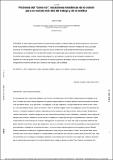Por favor, use este identificador para citar o enlazar a este item:
http://hdl.handle.net/10261/205182COMPARTIR / EXPORTAR:
 SHARE
BASE SHARE
BASE
|
|
| Visualizar otros formatos: MARC | Dublin Core | RDF | ORE | MODS | METS | DIDL | DATACITE | |

| Título: | Ficciones del “como no”: vocaciones mesiánicas de lo común para un mundo más allá del trabajo y de la estética |
Otros títulos: | Fictions of the “As Not”: Messianic vocations of the common for a world beyond work and aesthetics | Autor: | Vindel Gamonal, Jaime CSIC ORCID | Palabras clave: | Messianism Class Political exclusion Living labour Aesthetics State of emergency Mesianismo Clase Exclusión política Trabajo vivo, Estética Estado de excepción |
Fecha de publicación: | 2016 | Editor: | Universidad Complutense de Madrid | Citación: | Re-visiones 6 (2016) | Resumen: | [EN] This text traces the survival of St Paul messianism at various different landmarks in political philosophy, social activism and contemporary art practices. It takes the critical reconsideration of the concept of class as its starting point, showing us how it left behind the egalitarian universalism of the radical and interracial policy of early modernity (the transoceanic proletariat) to become a stable and discriminatory identity (the national working classes) designed to address the conflict between capital and labour. From this perspective, the second part of the article analyses the way in which recent social movements, inspired by the operaista rejection of Fordist work, are trying to go beyond the structural configuration of modern experience in which work and aesthetics have a key function. [ES] El texto rastrea la pervivencia del mesianismo paulino en diversos hitos de la filosofía política, el activismo social y las prácticas artísticas contemporáneas. Parte de la reconsideración crítica del concepto de clase, que pasó de invocar el universalismo igualitario de la política radical e interracial de la primera modernidad (el proletariado transoceánico) a constituirse en una identidad estable y excluyente (las clases obreras nacionales) destinada a encarar el conflicto entre capital y trabajo. Desde esa perspectiva, se analiza el alcance de los movimientos sociales más recientes a la hora de poner en crisis, partiendo del rechazo operaísta del trabajo fordista, la configuración estructural de la experiencia moderna derivada de la extensión del trabajo y de la estética. |
Versión del editor: | http://www.re-visiones.net/index.php/RE-VISIONES/article/view/166/295 http://www.re-visiones.net/index.php/RE-VISIONES/article/view/64/296 |
URI: | http://hdl.handle.net/10261/205182 | E-ISSN: | 2143-0040 |
| Aparece en las colecciones: | (CCHS-IH) Artículos |
Ficheros en este ítem:
| Fichero | Descripción | Tamaño | Formato | |
|---|---|---|---|---|
| Fictions_of_the_as_not.pdf | 227,54 kB | Adobe PDF |  Visualizar/Abrir | |
| Ficciones_como-no.pdf | 232,42 kB | Adobe PDF |  Visualizar/Abrir |
CORE Recommender
Page view(s)
173
checked on 16-may-2024
Download(s)
115
checked on 16-may-2024
Google ScholarTM
Check
Este item está licenciado bajo una Licencia Creative Commons

